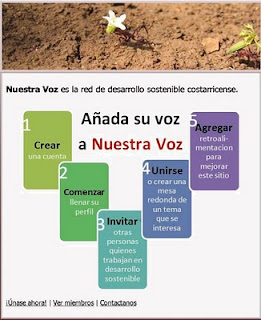 by Lara Sanoica
by Lara Sanoica
When I first offered to make phone calls to Spanish-speaking sustainable organizations in Costa Rica, other members of Nuestra Voz warned me that the Costa Rican accent was pretty difficult to understand. “And they’re very formal down there. Get used to using the ‘usted’ form!” So, I prepared for the worst when I made my first phone call that routed to a Costa Rican cell phone. The Spanish-speaking director on the other end was very accommodating, very clear, articulate and spoke at a gentle pace. I felt like I was talking with a language simulator where every word is pronounced in full and, if on the rare occasion I missed part of a phrase, I could politely ask for it to be repeated. Sometimes I got really lucky and the person on the other line actually spoke English, but even then we could continue on in Spanish with very few problems.
I suppose the overall ease of these conversations can be attributed to two major factors. The first is that I made a generic script with relevant vocabulary before I called. I did a little bit of research as to who I was calling, and wrote down more notes on words that pertained to their work. This strategy was recommended and encouraged by the Nuestra Voz team after their experiences dealing with transnational phone calls to non-native English speakers. Even if I didn’t follow the script, having that insurance nearby helped in case my nerves got the better of me.
The second factor is that I talk with Chilean university students on an almost daily basis. I met some Chileans when I was in high school, and we’ve kept in touch ever since. The verbal practice has been extremely helpful in my overall study of the language. For example, I learned to interpret, “¿Cuándo te levantái? Vamo’ a ir pa’ comprar uno ma’ po,” as “¿Cúando te levantas? Vamos a ir para comprar uno más.” Chileans like to drop their s’s, omit parts of words, and use a colloquial tú form in which they attach the Spanish vosotros ending -áis, and, you guessed it, drop the “s”. I suppose once you get used to the Chilean accent, everything else seems incredibly articulate. Other than adjusting to the more formal speech patterns, talking with Costa Ricans has been a cake walk in comparison.
I’m looking forward to contacting Costa Rica in the future, although I anticipate that not all phone calls will be as easy as the first one, especially once I begin contacting organizations that have never heard of Nuestra Voz. Until then, I am enjoying the conversations, suggestions, and potential future projects that I hear over the phone.




Comments
Post a Comment